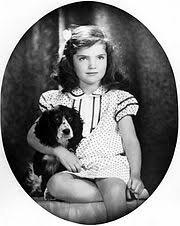JACQUELINE KENNEDY'S HISTORY
THE EARLY YEARS
When she was already an icon of the 20th century, Jacqueline Bouvier Kennedy once remarked, "I'v always been the same person." Of course, Mrs. Kennedy was very right - the resolute independence and strength, the sense of glamour and refinement which would later mesmerize the planet, was evident from even her earliest years.
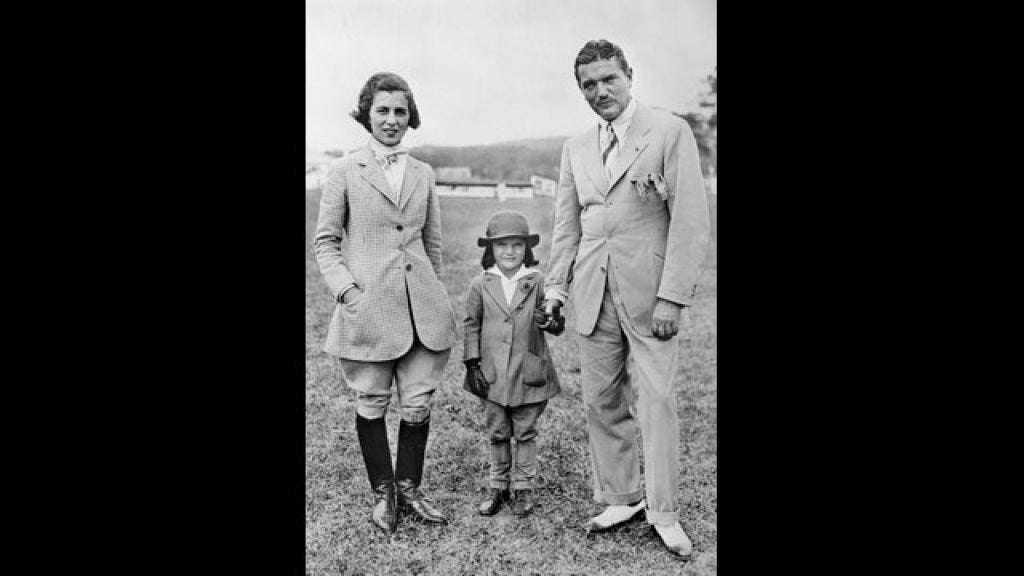
Jackie was born in privileged circumstances to unique parents. Her mother, Janet Lee, was an athletic and ambitious woman from a wealthy New York family. Her father, John Vernou Bouvier, III, who Jackie herself claimed, "cut a devastating figure," had movie-star good looks and a perpetual dark tan that, along with his playboy lifestyle, earned him the nickname "Black Jack." Jackie seemed to inherit the best of both her parents - she would receive her father's good looks and joy for ife along with her mother's polish and athleticism.
Jackie was raised in the elite social circles of New York City and Long Island. This meant she would enjoy great wealth and privilege as a young child. She was surrounded by elegant affairs and elegant people; she spent her time strolling along in Central Park or learning to ride horses in East Hampton. However, her station meant she was expected to act within strict social rules. Depression-era high society had a very definite idea of how young girls were supposed to behave and what they were meant to aspire to. The highly intelligent and independent Jackie often chafed at these restrictions.
Central Park
On one occasion, 4-year-old Jackie was taken for a walk through Central Park when she wandered away from her nanny and sister. The panic-stricken nanny ran home to report the terrible news to Jackie's mother. Poor Janet was beside herself for more than two hours when she finally received a telephone call from Central Park's police precinct. The officer explained that he found a little gilrl who gave him this phone number but would not give him her name "Could she be yours?" he asked. An hysterical, but hopeful, Janet ran to the police station to find Jackie sitting quite calmly on a stool, entertaining the police officers with her questions and comments. She had obviously become the darling of the Central Park Precinct. The officer turned to Janet with a smile on his face and reported that young Jackie had approached a policeman and announced, "My nurse and sister seem to be lost."
School Years
Jackie would progress throughout her childhood - delighting to be around with her looks and charm - testing her mother's patience, while being spoiled wildly by her father. At the East Coast's most prestigious schools for girls, first the Chapin School, then Holton Arms and Miss Porter's, Jackie became known for her intellect and rebelliousness, still chafing under the expectations that she be trained as a hostess and wife. One comment on a report card sums up this contradiction, "I wouldn't have kept Jacqueline, except that she has the most inquiring mind we'd had in the school in thirty-five years."
In fact, the art and literature which would become Jackie's life-long loves would provide her earliest sanctuaries from the real-life troubles which threatened to destroy her idyllic childhood. As her parent's marriage deteriorated and dissolved, as her father experienced dire financial difficulties, and as her mother moved her two daughters away from their beloved father after her remarriage to Hugh D. Auchincloss, Jackie would tuck herself into a corner to voraciously read, write or draw - lost keep in her own world.
Of course, this natural reserve of course did not prevent Jackie from forming a healthy adolescence. In fact, the mystery of her deepest thoughts made her all the more alluring to everyone around her as she blossomed into womanhood. She was a passionate young woman who was more complicated than the conventional rites of passage of a girl of her time. She was proclaimed "No. 1 Deb of the Year" by Igor Cassini when she was sixteen, she was popular at her school where she excelled academically, and was immediatley accepted at prestigius Vassar College at seventeen. But Jackie was not entirely enthusiastic about all this. She saw even more in her life for herself. She was extremely idealistic. She began to consider seriously how she would best serve society and humanity, and enjoy deeper pleasures in life for herself.
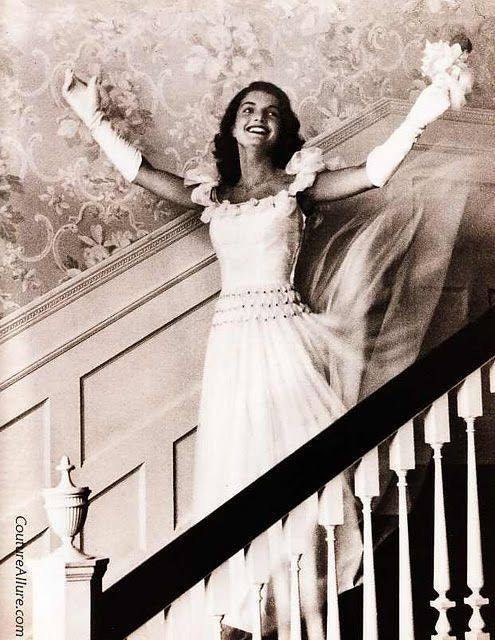
"DEBUTANTE OF THE YEAR 1947"
'Do you recognize her? It's Jacqueline Bouvier wearing a $59 off-the-rack dress in 1947. In 6 years, she would be the wife of Senator John F. Kennedy; and in another 7, she would be First Lady. Do you think she had any idea of what was to come behind that smile?"
Note: Jackie is 18 years old in this photo.
(Info courtesy of Couture Allure Vintage Fashion Blog)
GROWING UP
Jackie excelled at Vassar College, but went through great pains to be able to study in Paris during her junior year. Away from home and society expectations, she wrote of her year in Europe:
"I loved it more than any year of my life. Being away from home gave me a chance to look at myself with a jaundiced eye. I learned not to be ashamed of a real hunger for knowledge, something I had always tried to hide..."
She studied French Literature at the Sorbonne and spent as much time as possible exploring her roots in France. In addition to her course work, the industrious Jackie took a course in diplomacy at the Ecole de Science Politique.
Certainly, this new interest in diplomacy and governance influenced her decision to transfer to George Washington University her senior year. She wanted to be at the heart of public service for her nation, but it is doubtful that even Jackie could have predicted the role she would play in her adoptive city.
Inquiring Camera-Girl
After graduating from the University, Jackie ws ardent a bout earning her own living. She loved to wrie and approached the Washington Times-Herald. Although she was prepared to fill the newly vacant position of "Inquiring Camera-girl," her bosses assumed Jackie was a sheltered socialite and were doubtful that she could handle the job. She would prove them wrong and grew a column into one of the paper's most popular features. As Inquiring Camera-girl, Jackie would approach citizens of all stripes: senators, congressmen, pages, college boys, and houswives - and ask them a thoughtful question. She seemed to get a kick out of asking most startling or controversial questions. Some of the questions young Jackie asked around Washington were:
- Do you think bikini bathing suits are immoral?
- What do you think of wrestling as a sport for women?
- Do the rich enjoy life more than the poor?
- Are men as inclined to fall for a line as girls are?
- Would you like your son to grow up to be President?
- Which First Lady would you most like to have been?
- Should a candidate's wife campaign with her husband?
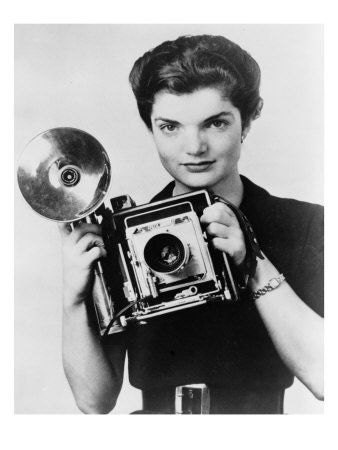
Increasingly, Jackie became ore and more interested in politics. She poured over journals and newspapers and became an authority on the political scene in Washington. Surely, it would pique her interest to meet a bright and hansome congressman from Massachusetts.
Since her final year at college, Jackie had been dating John Husted, a banker from New York and accepted his proposal of marriage. However, she realized she may have been overly influenced by her mother's desperate wish for Jackie to marry a wealthy man. Jackie did not want to marry Mr. Husted and needed more independence and more time to see more of the world and meet the extraordinary man whom she "could not live without."
Previously, mutual friends Charles and Martha Bartlett had introduced Jackie and John F. Kennedy thinking they were perfect for each other. Jack was certainly fascinated by Jackie, but Jackie remained reserved out of respect for her then-boyfriend John Husted. When the Bartlett's heard that the engagement was off, they feverishly began what Jackie would call "shameless match-making." Destined to reunite, Jack and Jackie would eventually find themselves invited to an intimate dinner at the Bartlett's home, where they embarked on one of America's greatest love stories.
Jack was a startling handsome man with a calling to service and a great vision for his nation and his entire world. In Jackie, he saw a woman completely different from the many girls he dated. She was more intellectual, more literary and more beautiful than the others. He saw a woman of great substance and depth of feeling with an appreciation for life that they completely shared. Jackie discovered she found a man who also wanted something more than just wealth and comfort. He sought to better the world he lived in. Jackie had met the man that she could not live without, and she knew she would be his parrtner in life and in politics.
CAMELOT
The Bouvier-Kennedy wedding was a national event. When Jackie arrived at the church, a drowd of more than three-thousand launched through police barricades to greet her. JJackie was resplendent in an heirloom dress of ivory silk taffeta. The bouffant skirt and lace vail were perfect antique touches. Inside the church, an audible gasp was heaerd when she entered. All eyes were on Jackie as she walked down the aisle past eight hundred people (even though the church only sat four hundred). The congregation included Governors, Senators, Congressmen, and other celebrities. The couple honemooned in Acapulco, Mexico, after a fairy-tale reception at her step-father's estate in Newport, Rhode Island.
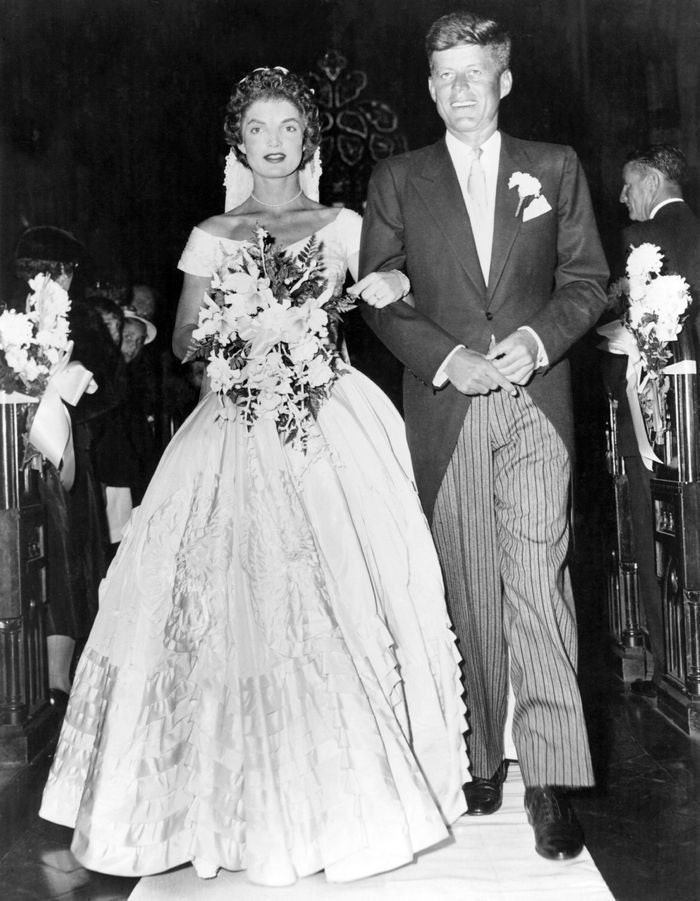
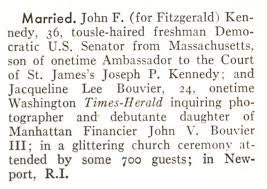
The earliest years of their marriage were difficult according to both Jack and Jackie. Like all marriages, these early years toko a great deal of compromise. But things were particularly complicated for Jackie when, as an essentially private person, she was thrust into the boisterous and very public life of a United States Senator. She adjusted, and then excelled, becoming an integral part of Jack's intellectual and professional development. She also became an essential part of his very survival as she nursed him back to health after a botched surgery to correct the constant back-pain he suffered since an accident while serving in World War II.
American Royalty
With Jackie at his side, both behind the scenes and in the public view, Jack would win every election he entereed include the Presidency of the United States. Everyone agreed that he wouldn't have done it without her. Jackie did not bother to put on a phony show of enthusiasm on the campaign trail. The crown sensed that and it impressed them. When Jackie addressed them, sometimes in fluent French, Spanish or Italian, they knew that they were getting a since voice and real opinions. This was priceless sfor Jack's campaign, and Jackie was tireless with a modern message. Of course, when the exultant Jack wond the Presidency, he knew he owed it all to Jackie. Jackie, however, was overwhelmed and frightened by the idea of being First Lady. She was only 31 years old.
Little did she know, she was about to be anointed American royalty. Jackie would redefine the role established by all the First Ladies preceding her, and become the stand by which all First Ladies after her would be judged. A national obsession, the slightest detail about Jackie would be picked up by the press as major news story for the next three years.
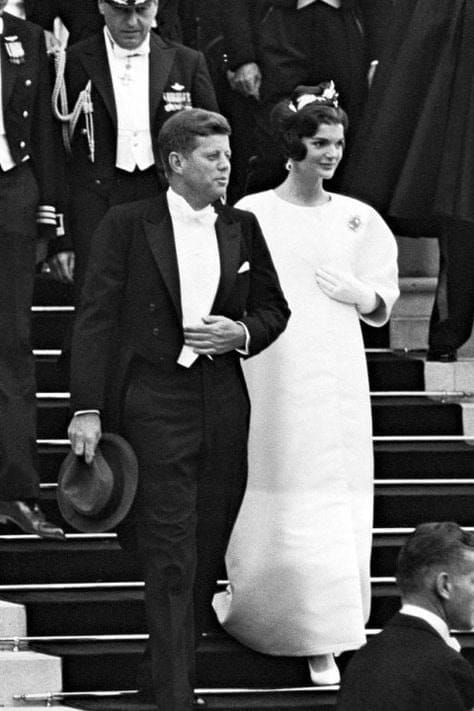
As First Lady, Jackie would prove invaluable to her huband in the same ways she did as a Senator's wife. John Kennedy Galbraith remarked, "Jacqueline Kennedy was deeply involved." She would render keen judgment with the politicians they would encounter - helping JFK judge who would help and who would hurt his policies. She would also be the perfect bridge between her husband's ideas and his constituency. She spoke French at a Cajun festival in Louisiana, Spanish to Puerto Ricans in New York, and Italian to immigrants in Boston. She was able to communicate the most complex ideas simply and elegantly.
Jackie may have carved out her role as First Lady. However, the press would guarantee her great impact on style. She was revolutionary. She grafted an old-world elegance with new-world energy, and she became the embodiment of the American spirit. She introduced classic lines and sleek profiles and presented herself in ways that are as fresh now as they were in 1961. Jackie forever modified fashion and dress for not only a female pubic figure, but the American woman.
Anything Was Possible
The young President blazed his New Frontier at home and abroad, while his wife mesmerized heads of state and the American people. This was the reign of Camelot, and Jackie was its chief designer. She literally transformed the White House with her wildly successful restoration and glittering pageants of culture that she brought through its doors - a coterie of diplomats, artists, intellectuals, and jet-setters - packed into three scant years was an unforgettable whirlwind of power and grace.
DARKEST TIMES
Jackie became a paragon of dignity and courage in those days after the tragic assassination of JFK. During his presidency, the nation had idolized her and after his death the nation needed Jackie to hold everything together. The country was stunned, even paralyzed with grief. Foreign leaders broke down in uncontrollable sobs at the great loss. Yet, despite Jackie's own personal devastation, she focused on her responsibilities to her children and the nation.
When she held her children's hands at the funeral, it was as if she was comforting all. She encapsulated the administration in an attempt to help everyone in the country move forward when she quoted the following lines from a musical to journalist Ted White:
"Don't let it be forgotten, that once there was
a spot, for one brief, shining moment that was
known as Camelot."
For years, Jackie seemed to live in a gray world of grief. She relied on the help of her friends, family and particularly, her brother-in-law Robert Kennedy for support. She was just beginning to come out of her mourning and to enjoy her life again when another tragedy struck in 1968. After her brother-in-law's assassination, Jackie was devastated. She claimed that she was only able to survive the death of her husband because of his brother's understanding and support, and now he too had been taken from her. Jackie fell into a deep depression and agonized over thoughts of her children's safety.
It took a long time for her to recover, and when she did, she proclaimed that she would live for her children first, and herself second. Jackie had realized that she had to make a choice. She had been expected to remain frozen in time--admired at first as First Lady, and now as First Widow. Was she to be a cold and unchanging dowager queen at 35? Jackie was a passionate woman who struggled to find some freedom from her grief.
The newly empowered Jackie began to treat herself, satisfying her insatiable curiosity with quiet times, books and private trips to exotic locales. She slowly began to enjoy herself again and her friends were delighted to be able to share her joy of life once more. She was skewered by the popular press, but she found the fortitude within herself to press on so that she may live again.
JET-SET
Soon, Jackie could be seen at Broadway plays and fine restaurants or gracing the streets of Paris and the beaches of Greece. Stewarded by Lee, her socialite sister, Jackie became engaged in the philanthropic world of intellectuals and power-brokers. Her life began to glitter once more.
Among these new friends was the richest man in the world - Aristotle Onassis. He was lavish, tolerant, comforting and adoring. Onassis was in a position to offer Jackie and her children protection and refuge from a world that had grown physically dangerous for the Kennedy's. Jackie married Onassis on his private island of Skorpios with a ceremony attended by only a few people. The world's press was furious with her, but Jackie did what she thought was best for her and her children.
Rose Kennedy knew the torture and consequences that Jackie suffered after the death of her son, Jackie's husband, and said, "It seems to me the first basic fact is that Jackie deserves a full life, a happy future."
As it turned out, the marriage was a poor alliance. Jackie did not want to leave New York because she felt her children had been uprooted enough. She kept her apartment on Fifth Avenue while Aristotle constantly traveled and they only spent 141 days together during their first year of marriage.
While this arrangement seemingly satisfied the couple, a widening gulf between Jackie and Onassis became outwardly apparent. After all, their interests were completely different and more often than not, they went their own ways. When Aristotle's son, whom he adored above all else, died in a tragic plane crash, their marriage completely unraveled. Onassis was inconsolable and became deeply depressed with morbid obsessions. Soon afterwards, he developed a progressive muscular disease and then passed away in 1975. Jackie was a widow for a second time.
After mourning with the Onasis family, Jackie returned to New York to begin a new chapter in her life.
INDEPENDENCE
Jackie had the means, and certainly the celebrity, to live like a queen. She could have had an endless line of limousines, opulent homes, exclusive resorts and lavish parties. Instead, Jackie wanted to create a real life for herself - one of independence that did not simply define her as the widow of two important men.
Jacqueline Bouvier Kennedy Onassis had written poems and stories since her earliest childhood, edited and contributed to the writing of one of the most important administrations in the United States, moved in the widest possible circle of international intellectuals, artists, and authors. Combined with her intelligence and unerring sense of style and aesthetics, Jackie had been groomed her whole life to edit books. On September 22, 1975, Jacqueline Bouvier Kennedy Onassis, the most famous woman in the world, began her job as an entry-level Associate Editor at Viking Press.
Jackie shocked her coworkers at how seriously and brilliantly she worked in her new position. She quickly learned the specifics of the publishing business, and used her natural talents to acquire and edit her first book for Viking. She never expected preferential treatment, waited in line for office equipment and made her own coffee. She was excelling on her own terms, putting her formidable mind and expericnce to work.
Her private life was more serene than ever. She began to come to terms with the experiences that had deepened her appreciation of everyday life. She spent most of her time working on her beloved books and enjoyng as much time as she could with her family. She never lost her glamour and remained the undisputed queen of the social set. She alighted at select events with the beautiful people, but she definitely preferred home-cooked meals and quiet evenings at home with her children above all else.
She began a fulfilling relationship with Maurice Tempelsman, a financier and man of great sophistication. They allowed each other to "become more themselves." Maurice was extremely discreet and kept a low profile which met Jackie's love of privacy. However, he was understanding about the rush of pubic interest that followed Jackie everywhere.
Throughout this period in her ife, Jackie's commitment to her children never wavered. Caroline and John were her proudest achievements and they experienced remarkably normal childhoods considering their extraordinary situation. Both children were deeply involved in charitable causes and working hard to make life better for others. As historian Arthur Schlesinger, Jr., once said: "They were brought up unspoiled, modest, hard-working, well-mannered."
THE FINAL YEARS
In 1993, Jackie contracted non-Hodgkin's lymphoma, a terrible form of cancer. She spent her last years fully and joyfully, always looking to grow and learn. No one could ever remember Jackie complaining during her ordeal, even when she was in great pain. Jackie moved many people to tears with her generosity when she often seemed more concerned for others than for herself.
On May 19th, 1993, Jackie left us, and her son infomed the waiting world:
"Last night, at around ten fifteen, my mother passed on...surrounded by her friends and her family and her books and the people and the things that she loved. And she did it in her own way and her own terms, and we all feel lucky for that, and now she's in God's hands."
From a shy and witty girl growing up in Jazz-age Hamptons, to the blinding brightness of her reign as First Lady and its end as a mourning widow, and then a literary life she defined on her own terms, Jackie lived with grace and courage and commitment.
The bells at the National Cathedral tolled 64 times on the day of her funeral, once for every year of her extraordinary life. It was an extraordinary life indeed, and the world is most defintely a better place because of Jackie Kennedy.
JACKIE'S TIMELINE
1929 - Born in Southampton, NY, to Janet Lee and John V. Bouvier, III, on July 28 1933 - Sister Caroline Lee was born on March 3
1938 - Wins Blue Ribbon at East Hampton Horse Show
1940 - Parents divorce
1942 - Mother marries Hugh Auchincloss; Jackie goes to live at Merrywood 1944 - Enrolls at Miss Porter's School
1947 - Named Debutante of the Year; enrolls at Vassar 1948 - Makes first trip to Europe
1949 - Attends the Sorbonne for a year as an exchange student 1951 - Graduates from George Washington University
1951 - Wins Vogue's Prix de Paris writing contest; introduced to Congressman John Kennedy
1952 - Announces engagement to John Husted in January; breaks of engagement in March
1952 - Assigned to be Inquiring Cameral Girl at Washington Times Herald
\1953 - Announces engagement to John F. Kennedy on June 23; marries on September 12 1957 - Father, John "Black Jack" Bouvier, dies on August 3
1957 - Daughter Caroline Bouvier Kennedy born on November 27
1960 - Kennedy defeats NIxon making Jackie First Lady elect; son John, Jr., born on November 25
1961 - Kennedy inauguration on January 20 makes Jackie third-youngest First Lady
1961 - Announces White House restoration plans February 23
1962 - Hosts televised tour of the White House on February 14
1962 - Meets with Pope Paul XXIII in Rome on March 11
1963 - Gives birth to son Patrick Bouvier on August 7, who dies two days later
1963 - John F. Kennedy assassinated on November 22
1964 - Moves to New York with children
1968 - Robert Kennedy assassinated on June 6
1968 - Marries Aristotle Onassis
1975 - Joins in fight to save Grand Central Station (NYC) 1975 - Onassis dies March 15 1976 - Hired at Viking Press as book editor
1978 - Moves to Doubleday as associate editor 1979 - John F. Kennedy Library and Museum in Boston dedicated on October 20 1982 - Maurice Tempelsman moves into 1040
1988 - Becomes grandmother for first time to Caroline's daughter Rose Kennedy Schlossberg
1994 - Dies on May 19 in NYC; buried next to JBK in Arlington, VA, four days later
INTERESTING FACTS ABOUT JACKIE
- Jackie Kennedy is the second most recognizable "face" in the world. The first is Mickey Mouse!
- John F. Kennedy was the ultimate love of her life.
- Jackie was 14 years younger than JFK.
- When JFK proposed to Jackie, she was engaged to John Houston, a NY stockbroker.
- Jackie and JFK were married for 10 years before his assassination.
- JFK never collected a salary as Congressman, Senator or President
- Jackie was the third youngest First Lady in U.S. history.
- Jackie was the most famous widow in the world for 5 years. She married Aristotle Onassis making her the ultimate trophy wife
- When Jackie was married to Onassis, he was the richest man in the world.
- Jackie was very tall at 5' 9-1/2."
- Jackie changed her clothing 3 times a day and always dressed for dinner.
- Jackie lived in 5 homes at any one time during her entire life: main home, weekend home (horses), winter home, summer home, and vacation home.
- Onassis rarely handed Jackie a gift. He would most often surprise her with jewelry hidden on her breakfast tray. The snowflake bracelet was found in her scrambled eggs; the matching earrings were hidden in the bread rolls.
- Jackie and Onassis lived on the yacht Christina. It was converted into their home from a Canadian war ship and the ship rarely stopped. Helicopters brought them to land and back.
- When Jackie died in 1994, she was buried next to JFK in Arlington Cemetery.
- Growing up, Jackie's hero was Charles de Gaulle. She even had a poodle and named him Gaully.
- Jackie met Charles de Gaulle on her first trip to Europe as First Lady.
- Charles de Gaulle was old enough to be her grandfather. Despite this, he was rumored to be infatuated with Jackie.
- Jackie was a strong swimmer and loved water skiing.
- POSH living comes from the sequence of living on the proper side of the ship when going shopping in Europe - Port Out, Starboard Home. Never traveling on the sunny side of the ship was considered POSH because of no air conditioning that side of the ship was reserved for the wealthiest.
- JFK's father was a first major-mover in Hollywood and introduced JFK to many movie stars
- All the clothing we wear today, the styles that lasted were shaped by 3 women: Jackie Kennedy, Grace Kelly, and Audrey Hepburn. All were born within 3 mos. of each other. They were each the same height and all died too young.
- Jackie had replicas made of many of her own jewelry pieces. For example, the Starburst Pin she had copies made for fear of losing the diamonds.
